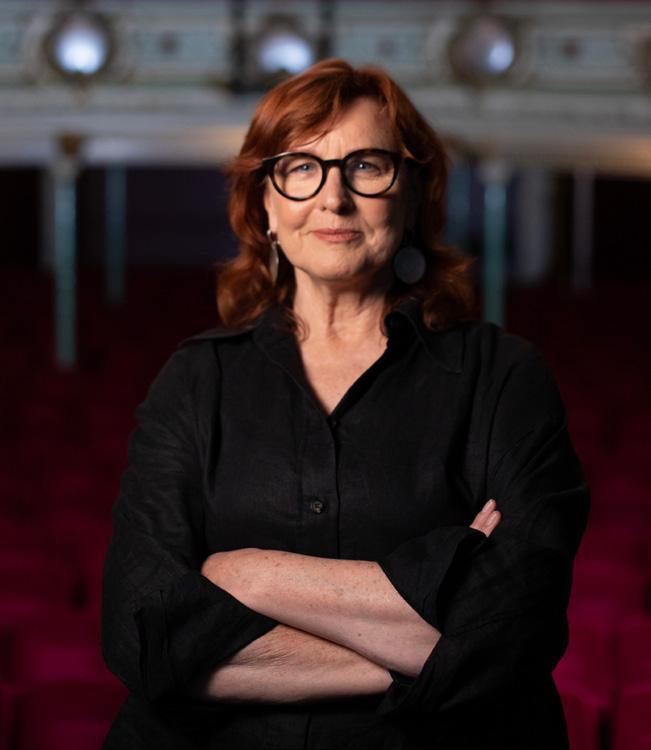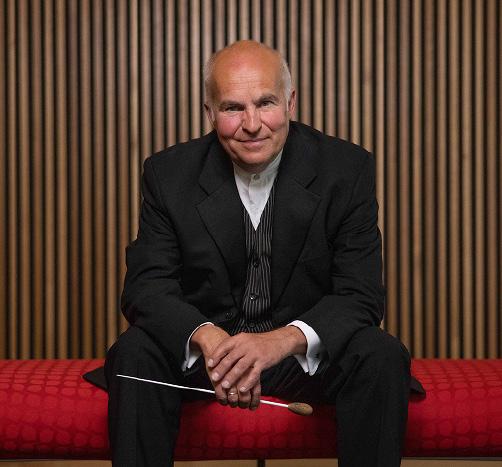PUCCINI DOUBLE BILL
Two x One Act Operas

Two x One Act Operas
Music by Giacomo Puccini
Libretto by Giovacchino Forzano
Performed in Italian with English surtitles.
Conductor Johannes Fritzsch
Director Lindy Hume
Set & Costume Designer Isabel Hudson
Lighting Designer Keith Clark
Conservatorium Theatre
3–7 September 2024
Griffith University acknowledges the Traditional Custodians of the lands on which we work, and pays respect to the Elders, past and present, and extends that respect to all Aboriginal and Torres Strait Islander peoples.

As Conservatorium Director, it is my pleasure to welcome you to this year’s major opera production, one of the highlights of our 2024 calendar. This is culmination of months of intensive preparation for which we acknowledge Johannes Fritzsch as Music Director, Lindy Hume as Director, Jill Stoll as co-ordinator, coach and repetiteur and the entire production and teaching team who have worked tirelessly alongside them.
Enabling such a production always requires significant community support and investment. We are ever grateful to Griffith University’s leadership and to the Arts Education & Law group for recognising the pivotal importance of the performing arts in our ecosystem—we acknowledge both the financial investment in the Conservatorium and also their collective and personal investment of care and time, evident not least in their regular attendance at events, including this one. This production would not have been possible without dedicated philanthropic support—thank you to those who gave, in many cases substantially, to bring this project to fruition.
September is always an exciting time of year for the arts in Brisbane, with this production proudly part of the Brisbane Festival, one of the capstone moments, particularly for our classical voice students. We are grateful to the festival for their multiple inclusions of our students’ events across the festival and for featuring this double bill so prominently in their publicity.
Each member of our audience matters to us! Thank you for being with us to support the students and to witness the work, both now and across the years. As Queensland’s Conservatorium, we seek always to be building our connection to place and people, trusting in the power and resonance of art—if this is your first time, we look forward to welcoming you again in future.
I am sure everyone will have a wonderful time! Thank you for supporting arts in Queensland.
At sunset, in a closed convent community, hymns are sung in the chapel. The Monitor and Mistress of the Novices distribute penances for minor transgressions, before allowing the sisters recreation in the courtyard. This is the first of three evenings each year when the setting sun turns the water fountain golden, an event that causes the sisters to remember Bianca Rosa, a sister who has died. When Sister Genovieffa suggests they pour some water onto her tomb, Sister Angelica reflects on worldly desire and the beauty of death.
The Monitor reproaches the nuns for any desire for worldly pleasures, but Sister Genovieffa confesses that she longs for the soft lambs she tended to as a shepherdess, and Sister Dolcina for sweet foods. Sister Angelica claims to have no desires, prompting gossip among the nuns. They know Sister Angelica longs to hear from her wealthy family, whom she has not heard from in seven years. It is rumoured that she was sent to the convent as punishment.
The Infirmary Sister needs Sister Angelica to make a herbal remedy for a wasp sting. Two sisters bring supplies and news that a grand car is waiting outside the convent. Sister Angelica becomes nervous and upset, sensing that someone in her family has come to visit her. The Abbess chastises her for her fretfulness and announces the visitor is the Princess, Sister Angelica’s aunt.
As guardian to Angelica and her sister after their parents died, her Aunt has control over her two nieces’ inheritance. She now requires Angelica to sign a document transferring the whole inheritance to her sister Anna Viola, who is marrying a man willing to ignore the shameful stain Angelica has brought on their family. The Princess still seeks to punish Angelica, who begs for news of the son who was torn from her at birth seven years ago. After an ominous silence, the Aunt reveals that the boy has died of fever two years previously, leaving Sister Angelica devastated. Left alone, she is enraptured by a vision of her son in paradise and begins to imagine an escape from her pain in death.
Ecstatic, Angelica prepares a poison and says her farewells. On drinking the poison, she panics. By the act of suicide, she has committed a mortal sin, damning herself eternally. As she dies, she begs the Virgin Mary for mercy and experiences a transcendent vision.
In an apartment in Florence, the recently deceased Buoso Donati’s relatives mourn his passing. Those present are his cousins Zita and Simone, his brother-in-law Betto, relatives Marco and Ciesca, Gherardo and Nella, their son Gherardino and Zita’s nephew Rinuccio.
A rumour flying around that Buoso has left everything to a monastery precipitates a frantic search for the will. The document is found by Rinuccio, who uses it to secure his aunt Zita’s permission to marry Lauretta, daughter of Gianni Schicchi, a newcomer to Florence. Zita replies that if Buoso has left them rich, he can marry whom he pleases. Rinuccio sends Gherardino to fetch Schicchi and Lauretta.
When the relatives read the will, their worst fears are realised: Buoso has indeed left his fortune to the monks. Rinuccio suggests that Gianni Schicchi might help them, offering passionate arguments in his favour, but the snobbish and oldfashioned family sneer at Schicchi’s humble origins. Schicchi and Lauretta arrive. Rinuccio begs him for help, but Schicchi is offended by Zita who tells him to leave and take his daughter with him. Schicchi swears he will have nothing to do with such people. Lauretta pleads with her father—she loves Rinuccio and wants to marry him. When she threatens to throw herself into the Arno river, Schicchi agrees to look at the will. At first, he concludes that nothing can be done, but then an idea occurs to him. He sends Lauretta outside.
Having established that only the family knows that Buoso is dead, Schicchi orders the body be hidden. A knock announces the untimely arrival of the doctor, Spinelloccio. Schicchi conceals himself and mimics Buoso’s voice. Declaring that he feels better, he asks the doctor to return that evening. Schicchi then unveils his plan: he will disguise himself as Buoso and dictate a new will. Rinuccio is sent for the Notary.
Delighted with the scheme, the family celebrate. When a funeral bell tolls, they fear the news of Buoso’s death has gotten out, but it turns out to be a false alarm. The family agree to leave the fair distribution of the assets to Schicchi. Each family member tries to bribe him with special requests for Buoso’s possessions, the most treasured of which are “the mule, the house and the mills at Signa”.
Schicchi changes into Buoso’s clothes, but before taking his place in the bed, he warns the family of the grave punishment for falsifying a will: amputation of one hand and worse—exile from Florence.
The Notary arrives. Disguised as Buoso, Schicchi declares prior wills null and void, allocating the minor bequests to the family’s satisfaction. However, when it comes to the mule, the house and the mills, he orders that these be left to “my devoted friend Gianni Schicchi”. Furious, the family can do nothing while the lawyer is present. Once the Notary leaves, Schicchi chases them out of what is now his house. There is now no bar to Lauretta and Rinuccio’s marriage. “What better use could there be for Buoso’s wealth?” Schicchi asks the audience, from whom he seeks forgiveness for his crime, due to “extenuating circumstances.”

The joy and the challenge of directing these two works for performance in one evening is in their extreme contrasts. Everything about them is so completely different, it’s incredible that they both came out of the same brain, alongside Il Tabarro, the first opera of the famous Puccini Trilogy, which we’re not presenting tonight. (I confess, it’s my least favourite of the three.)
From the outset we envisaged this production as one scenic environment containing two very dissimilar worlds. This makes sense, working within the budget constraints of a Conservatorium environment but it’s also been an interesting challenge to imagine a place where a closed community of nuns in Suor Angelica might overlap with the chaotic money-hungry Donati family of Gianni Schicchi. I had initially envisaged two eras of a room in some kind of palazzo that might have been converted into a convent, or vice versa, but ultimately designer Isabel Hudson and I decided on simplicity and to suggest, rather than be specific about architecture. So, our design is both a run-down indoor apartment for Schicchi and a verandah/ outdoor laundry for Angelica. Luckily, Puccini doesn’t generally require glamour. His currency is messy, imperfect people and big emotions, and there are plenty of those in play in both operas.
On the first day of Suor Angelica rehearsals, we were grateful and fascinated to have Sister Jone from the Sisters of Mary Morning Star generously come and speak with our cast about convent life. This was an influential conversation for many of us, one we have kept firmly in mind when creating a fictional setting whose confines, community and constraints define Suor Angelica’s predicament. However, respecting both the Church and the wild emotion of Puccini’s theatricality, here we have not been strict about Catholic religious ritual, iconography or historically informed nuns’ clothing for ‘our’ convent community.
While adoring his emotional richness, I confess I’m exasperated by the suffering Puccini assigns to one after another of his tragic heroines. Having directed both operas now, I’ve noticed weird parallels between Butterfly and Angelica—their suicides; the detailed fetishisation of the geisha in Butterfly and the nuns in Suor Angelica; both heroines are trapped, their motherhood doomed. These connections seem to me more than coincidental – they exemplify Puccini’s typecasting of women as noble yet somewhat passive victims. In 2024, this offers a challenge. We can’t save Angelica’s life at the end of the opera, but we can at least celebrate her free spirit, encourage her to rebel against the crushing regime of the convent; to fight the brutality of her Aunt; to express her individuality and her will. Suor Angelica may have limited choices, but she has infinite inner strength.
The delicious black comedy Gianni Schicchi could not possibly be further away in form, content or character. I adore this work, definitely the most complex test for a director, with each page requiring snappy responses, physicality and timing. It’s an exaggerated world in which each member of the Donati Family is a big personality—tough as old boots, greedy and criminal adjacent. From the mean old bag Zita and self-interested Simone and the grasping cousins, if there’s a buck in it, they’d throw each other under a bus in a heartbeat. Even Gianni Schicchi himself is an anti-hero, not above a little law-breaking himself. Still, he’s what most Australians would call a good bloke. He cheekily invites the audience to cut him some slack for the ‘extenuating circumstances’ of his minor crime, as it was for a good cause. This very Florentine story was premiered in New York in the 20th Century. We’ve moved the action from the 13th Century to a more recent (if vague) timeframe, drawing from contemporary comedy tropes and off-centre aesthetics around us. Isabel and I have been influenced by eccentric character-driven filmmakers like the Coen Brothers and Wes Anderson, and by our society’s fascination in hideous families in shows from the Kardashians to Succession to Schitt’s Creek, where family gatherings always end in tears. Wondering why the Christmas tree and decorations? We wanted a family celebration to go terribly wrong for this family who loathe each other, and we came up with Christmas. (Random fact: the original Gianni Schicchi, Giuseppe di Luca was born on Christmas Day.)
It’s been a joy to dive into this project with this beautiful cast of students and my excellent colleagues Jillianne Stoll and Maestro Johannes Fritzsch, with whom it is always such a privilege to work. We hope you enjoy both of these wonderful works. To anyone who has endured an awful family Christmas lunch, this one’s for you.
CAST IN ORDER OF APPEARANCE
ROLE STUDENT
Sister Angelica Sarah Hubbard
The Monitor Lauren Towns
The Lay Sisters Erin Power & Eireann Mears
Sister Lucilla Claire McCann
The Mistress of the Novices Aylish Ryan
Sister Osmina Sienna Jak
Sister Genovieffa Gianna Guttilla
A Novice Bridgette Kelsey
Sister Dolcina Amelia Price
The Infirmary Sister Zoe Catchpoole
Sisters bringing provisions Olivia Munro & Sienna Jak
The Abbess Xanthe Allen
The Princess Morgan Rosati
Sister Clavaria Emily Davies
Understudies
Sister Angelica – Gianna Guttilla
Sister Genovieffa – Rebecca Goobanko
SOPRANOS
Isabelle Dunstan
Rebecca Goobanko
Sienna Jak
Bridgette Kelsey
Claire McCann
Jade Okey
Erin Power
Amelia Price
Louise Whittaker
MEZZO SOPRANOS
Georgia Butland
Johanna Collins
Emily Davies
Jasmine Kaye
Eireann Mears
Emma Mueller
Caitlin Wans
Elliott Beauchamp
Liam Jackson
Freddie Klein
Ryan Lawrence
Nicholas Russell
Liam Waldock
OFFSTAGE BASSES
Vikram Goonawardena
Harrison Hammett
Jake Lyle
Nicholas Massouras
Joseph Pestorius
Gabriel Shaw
David Upcher
Gianni Schicchi
Rinuccio
Dallas Tippet
Phillip Costovski*
Lauretta Monique Grima
Zita Anita Parakh-Morgan
La Cies ca Monic a Ruggiero
Nella Matilda Smith
Gherardo
Marco
B etto di Signa
Freddie Klein
Jake Lyle
David Upcher
Simone Vikram Goonawardena
Gherardino Philomena Hoger
Spinelloccio (Doctor) & Amantio di Nicolao (Notary)
Pinellino (Shoemaker)
Guccio (Dyer)
Buos o Donati
Harris on Hammett
Gabriel Shaw
Nicholas Mass ouras
Liam Waldock
Understudies
Nella – Rebecca Goobanko
Rinuccio – Liam Jackson
*Alumnus
CONCERTMASTER
Luke Hammer*
VIOLIN 1
Olivia Spyrou
Sophie Shih
Lauren Mellor
Madison Sim
Kezia Marvella
VIOLIN 2
Haneulle Lovell*
Lydia Hwang
Kate Stone
Teresa Kao
Ava Gilbert ~
Lauren Moon ~
Chinsia Burns +
Amalie Grime + VIOLA
Caitlin Annesley*
Eben Yeh
Dylan Weder
Harriet Dykes
Liam Holbrook
VIOLONCELLO
Matthew Stuart-Street* ~
Stirling Hall* +
James Pollard
Liam Gane ~
Emma Seedell-Green +
CONTRABASS
Deakin Darby*
Cooper Le Broq
Jessica Clarke
FLUTE
Amy Tashjian*
OBOE
Liam Robinson*
CLARINET
Catherine Edwards*
BASSOON
Georgina Sinclair*
FRENCH HORN
Emma Rolfe*
Mathilda Monaghan
TRUMPET
Melissa Davies*
BASS TROMBONE
Joshua Sephton*
TIMPANI
Jaymee Homeming* ~
Connor Dineen* +
PERCUSSION
William Smith*
HARP
Myiesha Maisuria*
PIANO
Jill Stoll*
ORGAN/HARP
Artemii Safonov* ~
CELESTA
Bradley Nolan* ~
Artemii Safonov* +
~ Suor Angelica + Gianni Schicchi * Principal

Johannes Fritzsch joined the Queensland Conservatorium Griffith University as Professor of Opera & Orchestral Studies in 2019. From 2008 to 2014 Johannes served the Queensland Symphony Orchestra as Chief Conductor and from 2020 to 2022 as Principal Conductor and Artistic Advisor. Since then, he has enjoyed the relationship as the QSO’s Conductor Laureate. From 2018 to 2023 he was the Principal Guest Conductor of the Tasmanian Symphony Orchestra. From 2006–2013 Johannes was Chief Conductor and Artistic Director of the Oper Graz, Grazer Philharmonisches Orchester (Austria). Prior to his appointment in Graz, Johannes held the position of Chief Conductor and Artistic Director of the Staatsoper Nürnberg. From 1993 until 1999, he was Chief Conductor and Artistic Director of the Städtische Bühnen and the Philharmonic Orchestra in Freiburg. He has conducted many leading orchestras, both within Germany and internationally. He regularly conducts the major Australasian orchestras as well as leading productions for Opera Australia, Opera Queensland, West Australian Opera and State Opera of South Australia.
Over the past twenty years, Johannes has given many Masterclasses for the German conductor training and development organisation Dirigentenforum des Deutschen Musikrates. Similarly, he was active and enthusiastic in the training of conducting participants selected to take part in Symphony Services’ International Conductor Development Program. In 2017, the Tasmanian Symphony Orchestra invited him to design and lead the newly founded Australian Conducting Academy.

Lindy Hume DIRECTOR
Lindy Hume is one of Australia’s leading directors, acknowledged internationally for fresh interpretations of a wide variety of repertoire and progressive artistic leadership of Australian arts organisations and festivals including Perth Festival, Sydney Festival, and more recently Four Winds Festival and Ten Days on the Island. Hume has led a total of twelve Australian international festivals spanning the period 2004-2023, her thoughtfully curated and welcoming programs leaving a substantial legacy of stellar global creations, bold and diverse new Australian works, projects fore-fronting contemporary First Nation cultures, progressive socially engaged practice and deep community connections in regional and urban centres across Australia.
Equally at home in opera, Lindy Hume has served as Artistic Director of four Australian opera companies: West Australian Opera, Victorian Opera, OzOpera and Opera Queensland. As a stage director, she regularly creates new theatre and opera productions in Australia, NZ, Europe, US and the UK, including major productions for renowned international companies such as Opera Philadelphia, Seattle Opera, Houston Grand Opera, Royal Swedish Opera Stockholm, Deutsche Staatsoper Berlin, Aldeburgh Festival, Welsh National Opera and eight productions for New Zealand Opera. In Australia she has created 80+ small-to-large-scale productions, several new Australian works, and won two Helpmann Awards, for best director and best production. She has
created many productions for Opera Australia and the state companies as well as four Pinchgut Opera productions. Lindy Hume is well-known for creating popular and audience-friendly productions that are intelligent yet accessible, boldly theatrical and oriented toward feminist / humanist narratives. She has been a decades-long advocate for actively addressing gender bias, racial stereotyping and misogyny in opera, and a mentor for women in arts leadership.
Academically, Lindy Hume holds a Graduate Diploma in Arts Administration from the University of South Australia in 2007, an Honorary Degree of Doctor of Letters from The University of Western Australia in recognition of her contribution to the cultural life of Western Australia, and in 2021 received her PhD from Queensland University of Technology. In the 2021 Australia Day Honours, she was made a Member of the Order of Australia (AM) for significant service to the performing arts, particularly to opera.
Since 2005 Hume has chosen to live in regional Australia, and now travels between bases in Tathra on the Far South Coast of NSW and Port Sorell in the North of Tasmania. Her experience and deep interest in creative practice outside metropolitan centres inform her Currency House Platform Paper (2017) Restless Giant: Changing Cultural Values in Regional Australia and her recent PhD thesis A Bigger Picture: Toward a Landscape Oriented Creative Practice. Hume is recognised as one of Australia’s leading thinkers and writers on creative life in regional Australia.
In a wide-ranging career spanning over 30 years, 2023 saw Lindy Hume commencing work as Creative Director of Crimson Rosella, a new cultural enterprise in regional Australia. As a director, writer and creative leader, she welcomes the prospect of exploring unexpected new directions and creative adventures.

Isabel Hudson is an award-winning set and costume designer. Isabel holds a Bachelor of Design from NIDA and a Bachelor of Arts (Screen and Sound) from the University of New South Wales. She is a lecturer at NIDA in Design for Performance.
Design credits include: A Fool in Love, Constellations, Hubris and Humiliation (Sydney Theatre Company); The Mousetrap costume (Crossroads Live); Jailbaby, Pony (Griffin Theatre Company); Torch the Place set (Melbourne Theatre Company); Blessed Union, Winyanboga Yurringa, Every Brilliant Thing (Belvoir); Master Class (Ensemble Theatre); Maureen: Harbinger of Death (Sydney Festival/Rising Festival); Young Frankenstein set, American Psycho set, Cry-Baby set (Hayes Theatre Co); La Bohème (Opera Australia); Farnace (Pinchgut Opera); Son (Circa); Rise and Fall of Little Voice (Darlinghurst Theatre Co.); The Shifting Heart, Blackrock (Seymour Centre); Edward the Emu (Monkey Baa Theatre); Dry Land set, She Rode Horses like the Stock Exchange (Kings Cross Theatre); King of Pigs, Eurydice (Old Fitz); Jess & Joe Forever, (Belvoir 25A); Little Borders costume (Old 505 Theatre); Chamber Pot Opera (Sydney Opera House, Edinburgh Festival, St Petersburg season); Intersection, Journey’s End (ATYP); The Rolling Stone (Outhouse Theatre Co); Hurt (HotHouse Theatre & Downstairs Belvoir).
For Global Creatures Isabel is associate set designer for Moulin Rouge Australia, Korea and Japan. For Opera Australia, Isabel was assistant designer for The Merry Widow and My Fair Lady, and for Sydney Theatre Company, she was associate designer on Fun Home, directed by Dean Bryant.
Isabel has won four Sydney Theatre Awards for her outstanding designs: best set design for Constellations, American Psycho and Cry-Baby, and best costume design for Hubris and Humiliation. She also won an APDG award for best set design for American Psycho. Nominations include: an APDG Award for best set design, and two more Sydney Theatre Award nominations for best set design. She was awarded the Kristian Fredrikson Scholarship in 2022 and the Thelma Afford Award for Costume Design in Stage and Screen in 2022.

Keith Clark’s lighting design work includes Single Asian Female (La Boite Theatre Company), Boy Girl Wall and Packed (The Escapists), Handle with Care (Joymas Creative), De-Generator, Opposite of Prompt, AngelMonster, and The Machine that Carries the Soul (Phluxus Dance Collective), Moon Spirit Feasting (Elision Music Ensemble), Juice (The Crash Collective), Kazka and Legend (Lehenda Dance Company), The Laramie Project (Forward Movement), The Wind in the Willows (La Boite Theatre Company) Die Opernprobe & Der Häusliche Krieg (Lisa Gasteen National Opera Program) and Tarnished (La La Palour).
At the Queensland Conservatorium his lighting designs include Grease, Street Scene, Beatrice and Benedict, Iolanthe, Dido and Aeneas, 42nd Street and Legally Blonde. Improvised designs have been for such artists as The Necks, Jeff Lang, The Ordinary Fear of God, Aaron Goldberg, Kate Miller-Heidke, and Nakhane. Keith’s designs for various productions have toured nationally and internationally to Europe and America. He is also a member of the award-winning independent theatre group The Escapists.
Production Manager Len McPherson
Stage Manager Lialize du Plessis
Assistant Stage Managers Isabelle Markham
Bella Wilkinson
Orchestra Manager Daniel Fossi
Movement Coach Lois Redman
Head Mechanist & Flys Dylan Smith
Mechanist & Flys Isaac Chapman
Lighting Desk Operator Stu Cochrane
Wardrobe Coordinator Anita Sweeney
Sound Technician Tobias Trstenjak
Wardrobe Assistant Beth Cook
Hair & Makeup Corin Cosh
Work Integrated Learning Trainee Charlie Crook
WITH THANKS
Opera Queensland – Alex Loh, Karen Cochet, Bianca Bulley, Annette (Nettie) Kerwitz, Rhiannon Booth
Set Build and Install – A Noble Event
Special thanks to Tony Noble, Shane Rushbrook Timothy Tate – zero.one.four.six
Vocal Coach, Repetiteur & Chorus Master Jillianne Stoll
Assistant Conductor Nathaniel Griffiths
Italian Language Coach Teresa Desmarchelier
Surtitles Courtesy of Opera Australia
Surtitle Technicians
Surtitle Operator
Buck Outdoors Pty Ltd
John Woods
These performances of Suor Angelica & Gianni Schicchi by Giacomo Puccini, with libretto by Giovacchino Forzano, are given by permission of Hal Leonard Australia Pty Ltd, exclusive agents for Casa Ricordi S.R.L. of Milan.
Orchestral edition by Bryan Higgins, by arrangement with Motet Music Publishing Company.
SPECIAL THANKS TO QUEENSLAND CONSERVATORIUM SUPPORTERS AND DONORS.
Queensland Conservatorium would like to acknowledge the generous support of Mr Philip Bacon AO and Mrs Kay Bryan OAM.
Phillip Costovski’s appearance is proudly sponsored by:
Ms Julia Gray and Mr Ian Craig
Mr Ian Hanger AM KC & Dr Maria Hanger
Dr Eddie Street AM and Mrs Judy Street
Dr Nancy Underhill DUniv
Anonymous x 2
Grateful thanks to Opera Australia for providing the surtitles for the performances.
Director Professor Bernard Lanskey
Deputy Director Associate Professor (Learning and Teaching) Donna Weston
Deputy Director (Research) Dr Alexis Kallio
Head of Ensembles Professor Peter Morris
Cons ervatorium Manager Stuart Jones
Technical Team Leader Cameron Hipwell
Front of House Michael Hibbard
Operations Manager
Executive Officer Dr Natalie Lewandowski-Cox (Engagement)
Ens embles Program Daniel Fossi Coordinator
Operations Administrator Clare Wharton
Technical Officers
Keith Clark, Amy Hauser, Len McPherson, Dylan Smith, Tobias Trstenjak
Venue Officers Jos eph Gale-Grant, Grace Royle, Joshua White